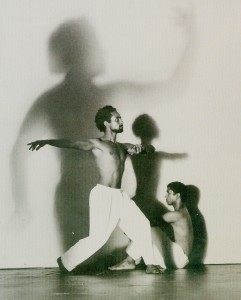
The Falaki theatre was abuzz with chatter before the play started. The familiar sound of a Spanish rolling ‘r’ was everywhere as a sea of European and Egyptian faces peered intently at the stage. Suddenly, the room was filled with music; no doubt familiar to the Spaniards, no doubt exotic to the Egyptians. The play had begun.
El otro, or The other, is the creation of Spanish director and actor Marco Magoa. The play was produced by the Spanish embassy in Cairo and is completely in Arabic to emphasise cultural exchange. The play was inspired by the poetry of Spaniards Ángel González and José Hierro, which Magoa said helped him to create, with the support of the embassy, El otro, in which he challenges audiences to let him take them on a “journey”.
Magoa said both poets had special significance for him. “González is from Asturias in northern Spain where I am from. So I am bringing to Egypt a part of my culture and my childhood, with its music, its people and its ocean. Both poets have lived through the Spanish civil war and their lives were difficult but their poetry is never sad; it is uplifting and optimistic, just like Egyptians after the revolution.”
Magoa added that this was a “gift” to Egyptians from him and that this was part of the idea behind the name. “The name comes from accepting the other. Everyone is scared of one another in different parts of the world and relations are not good. This is my gift to the Egyptian people.”
Much, if not most, of the play has a serene dream-like quality, with a mix of performance, acting, choreography, and music. The music is from the Asturia region of northern Spain. Coupled with the choreography of the lone dancer, Zizo, and the perfect classical Arabic recital of translated Spanish poetry (an art in and of itself), the play takes us on a journey that barely lasts 45 minutes but fills us with the sincere power of the poems.
“The music is a mix of traditional 17th and 18th century Spanish music and the later composed violin piece by Bach, who wrote it after witnessing Spanish dance and wanting to compliment it,” said Mogoa.
The play consists of four actors and a dancer. Of those only one is a woman and they are credited simply as ‘Man 1’, ‘Man 2’, ‘Man 3’, and ‘A Woman’, with the dancer Zizo as ‘the soul’.
The theatre was packed with everyone from aficionados to those who had come to see a free play, and included the local Spanish community and a few representatives from the different embassies.
Of the people who had come to see the play, most were well-behaved, though understandably some could not help themselves when the actress (and there is only one), slipped and fell right on the stage. The actress had slipped on account of the water used in a previous scene which was left on the floor. Whether or not the fall was part of the performance was irrelevant as the women in front of me started giggling uncontrollably before finally regaining composure. For the actress’ part, the fall did not deter her from a most dramatic and graceful rise, following the fall, and a subsequent exit from the theatre.
El otro is a melancholy but ultimately life-affirming meditation on life and its serene, hypnotic execution is definitely worth your time especially given that the entrance is free and the play is just shy of an hour.




